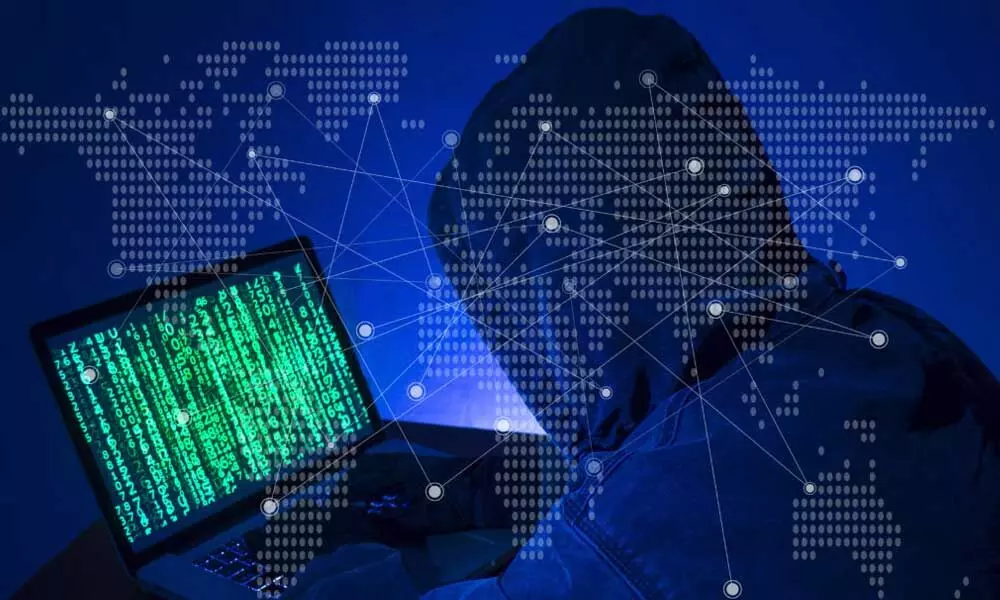Pak cyber terrorists eyeing Digital India
Singapore-based cyber security firm CYFIRMA said in its report that four hacking groups suspected to be sponsored by China, Pakistan and North Korea are targeting India’s digital space
image for illustrative purpose

Mumbai: Digital India is facing increasing cyberattacks from State-sponsored cyber terrorists of Pakistan. In its report, Singapore-based cyber security firm CYFIRMA named Pakistan and China of targeting India. The report, "India Threat Landscape Report 2020", has highlighted multiple cyber hacking groups which have been taking interest in India. It has specially named four hacking groups suspected to be sponsored by China, Pakistan and North Korea.
Defacing websites using a weakness in web applications, data exfiltration using specialised malware, denial of service, impersonating companies' website and launching malicious phishing campaigns are some of the ways in which the cyber terrorists plan to attack Digital India, the report says. According to the report, since India is a heaven for startups, and a fertile ground for technological innovation, generating a massive quantity of data that attract cybercriminals.
Recently, Pakistani cyberterrorists hacked an international webinar, organised by an Indian startup to create awareness on the packaging of food products. Sixty-nine experts hailing from seven countries, including Pakistan, were participating in the webinar. It was hardly 30 minutes after the beginning of the webinar when it was hacked by Pakistani cyberterrorists and started terrorising the participants using foul languages and giving threats to the organisers to blast off. The event disrupted by this sudden attack and organisers had to stop it midway.
The joint organisers of the webinar Atal Incubation Centre, Bihar Vidyapeeth and Institute of Packaging reported the incident to the police. Speaking to Bizz Buzz, Vijay Prakash, Chairman of Bihar Vidyapeeth and a retired IAS officer, said he and another organiser Pramod Kumar Karn had just finished their speeches before the webinar got hacked. "Cyber security precautions are now essential in all cyber activities. We should also circulate all stories of cyber-crime so that people may not fall prey to such incidents," the shaken bureaucrat observed.
Since the outbreak of global pandemic Covid-19, the US FBI reported a 300 per cent increase in cybercrimes. As if a pandemic wasn't enough, hackers leveraged the opportunity to attack vulnerable networks as office work moved to personal homes. Recent trends on cybersecurity statistics reveal a huge increase in hacked and breached data from sources that are increasingly common in the workplace, like mobile and IoT devices.
The world has witnessed a 350 per cent increase in ransomware attacks, a 250 per cent increase in spoofing or business email compromise (BEC) attacks and a 70 per cent increase in spear-phishing attacks in companies overall. India is among the top five countries with the maximum number of cyber-attacks. Government data shows that in 2019 alone, India witnessed 3.94 lakh instances of cybersecurity breaches. On September 22 last year, the Ministry of Electronics and Information Technology (MeITY) told the Parliament that Indian citizens, commercial and legal entities faced almost 7 lakh cyberattacks till August 2020. The Indian government has warned the defence services, financial institutions, PSUs, Internet service providers and prominent private sector organisations of a possible cyberattack by Pakistani hacker groups.
"Protection against such attacks not only requires an antivirus solution capable of treating infected objects but also a firewall, anti-rootkit functionality and control over removable devices," says Ravi Shankar, a cyber expert. He further added apart from that, there is another facet of controlling such incidents through cyber insurance cover.
Insurers have launched cyber insurance products on the retail front too. Though the product was doing well for corporates, it has merely two years ago when the insurers started selling cyber insurance cover for their retail customers. Cyber-care is the buzzword related to cybersecurity. TA Ramalingam, Chief Technical Officer, Bajaj Allianz General Insurance, says that retail cyber insurance in India is still at a nascent stage as not many people are aware that such a policy exists. "We are hoping that as the digital exposure of people increases, they realise the importance of having this cover against the ever-evolving cyber risks."

